 Are you thinking about setting up an e-commerce website or selling goods to a foreign market? If so, then it’s a good idea to consider providing users with currency conversion.
Are you thinking about setting up an e-commerce website or selling goods to a foreign market? If so, then it’s a good idea to consider providing users with currency conversion.
Currency conversion tools allow your web visitors to have the cost of an international currency amount translated to their home currency at the point of sale. It also lets your visitors see the exact amount their card or PayPal account will be charged, expressed in their own home currency.
One advantage of adding currency conversion to your website is that it allows visitors to view and understand prices in foreign countries in their own home currency, making it it easier for customers to calculate their costs and expenses.
Fortunately, if you are a WordPress user, it’s easy to add a currency converter to currency conversion to WordPress via a plugin, allowing your customers to quickly determine the cost of your goods.
Currencyr
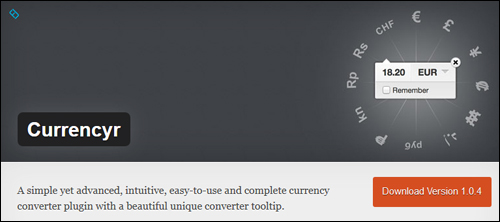
Currencyr is a simple, easy-to-use and complete currency converter plugin with a unique converter tooltip. It’s also free!
The Currencyr useful WP plugin includes features like the following:
- In-line converter
- Supports a number of exchange rates providers, like Google & FoxRates
- WP-Cron task scheduler enabled
- Widgetized currency table and converter
- Supports integration with a number of online shopping plugins like WooCommerce and Easy Digital Downloads.
- Can determine local currency automatically
- Supports full language translations
Note: The Currencyr plugin needs PHP 5.3.0 or later. Do not use this plugin if you currently have an older version of PHP installed on your server. Alternatively, ask your web host to check and upgrade your PHP server installation.
***
You can install the currency conversion plugin from your WP dashboard by searching for “currencyr” in the Plugins screen and clicking “Install Now” …
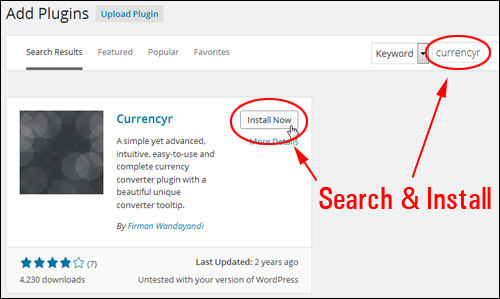
After installing and activating the plugin, you can configure the plugin’s settings by selecting Currencyr from your admin user menu …
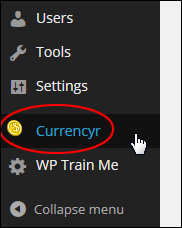
This takes you to the plugin settings page …
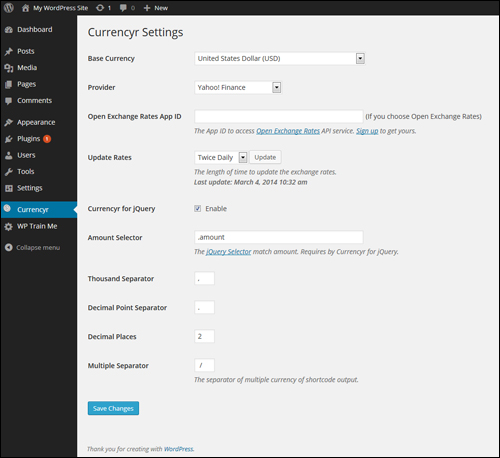
For example, you can select a base currency from a dropdown menu. The default base currency is ’US Dollar’ …
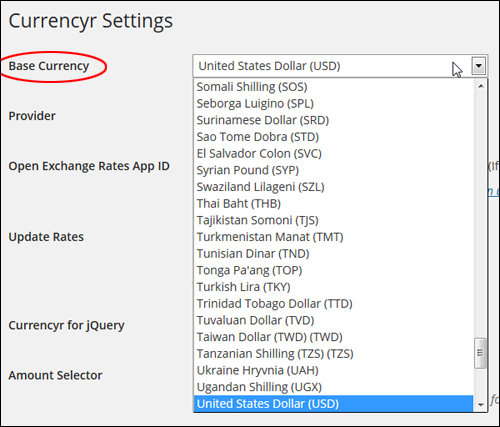
You can select any supported data provider from a drop-down menu. The default selection is Yahoo Finance, but you can also choose another option, like FoxRate or Google Finance …

Note: If you choose ‘Open Exchange Rates’, you will need to enter an API (Application Programming Interface) ID …

You can choose how often you would like the currency exchange rates to update by specifying an option from the ‘Update Rates’ drop-down menu …

The Currencyr plugin uses jQuery, which lets web developers add things like animation effects to web applications (e.g. WordPress plugins).
If you have no reason to change the jQuery settings, leave them as they are …

Edit the rest of the plugin settings and remember to click ‘Save Changes’ when you have finished configuring all the settings on this page …
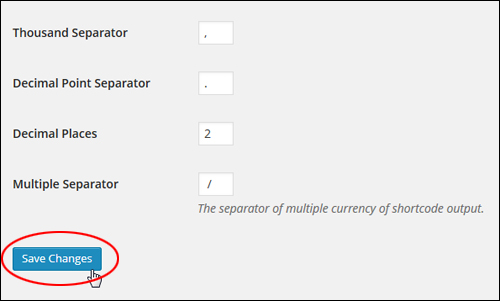
When your plugin settings have been configured, you can easily start adding currency conversion to any of your WP site’s pages and posts using a shortcode.
Refer to the ‘Additional Plugin Notes’ section further below to learn more about using currency codes (e.g. USD, AUD, CAD, etc …) with this plugin.
How To Use Shortcodes
You can insert currency conversion into posts, pages and widgets with no web coding knowledge using shortcodes.
Here are some examples of currency shortcodes that you can add to pages and posts:
Let’s say that you sell goods on your site for a fixed price (e.g. $175) in US Dollars (USD), and you would also like to show this price converted into British pounds (GBP) on your sales page.
All you need to do is add the shortcode below to your page content …

Note: You can also insert pricing in dollars and cents (e.g. 175.00, 189.00, 149.00, etc …)
The screenshot below shows how the shortcode will look when inserting it into the post or page …
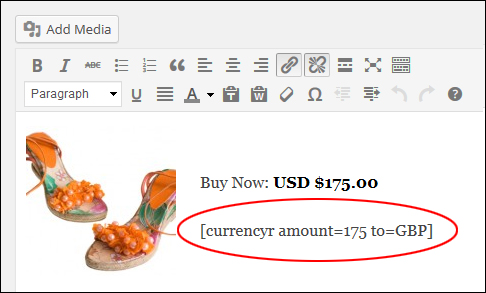
After publishing the page or post, the currency conversion will then appear like this …
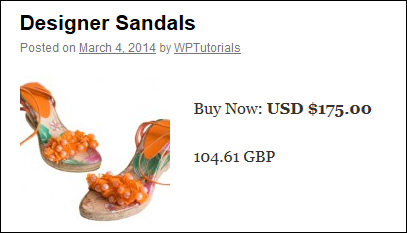
Using the above example, let’s now convert the same amount into multiple currency formats.
To do this, use the shortcode shown below (you can add as many currency symbols as you want separated by vertical pipes) …

You can see how the above shortcode looks when inserted into a page …

Once the post has been published, the converted currency will then display as seen below …
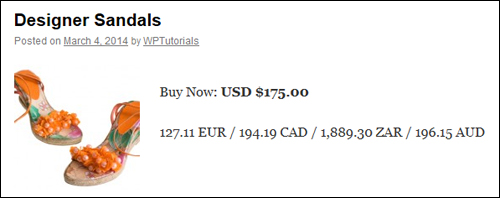
See the ‘Additional Plugin Notes’ section further below to learn how to change the currency separator symbol with the Currencyr plugin.
Now, let’s say that you want to select a different base currency than the one you have selected as your default.
For example, say you have specified your default base currency as EUR and you have a section on your site targeted to non-European customers (e.g. Australia or Canada), you can change the base currency using the following shortcode …

You can see how the shortcode appears when added to your content …
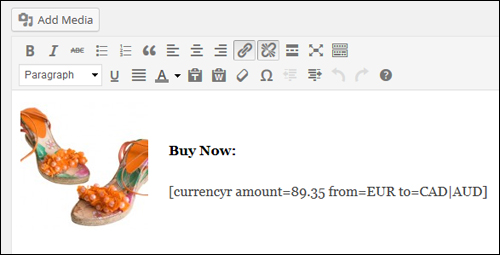
After publishing your page or post, your currency conversion will then display like this …
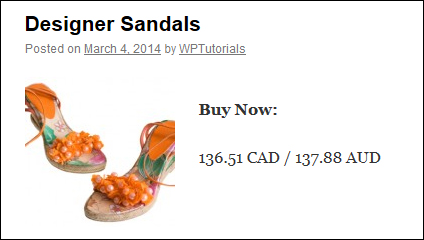
Using The Plugin Widget
You can also add a currency converter to your site’s sidebar using the Currencyr widget.
To add the currency converter to your sidebar, select Appearance > Widgets from the WP user admin menu …
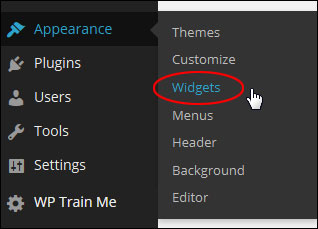
In the Widgets > Available Widgets area find the ‘Currencyr’ widget and drag it to the Active Widgets area …
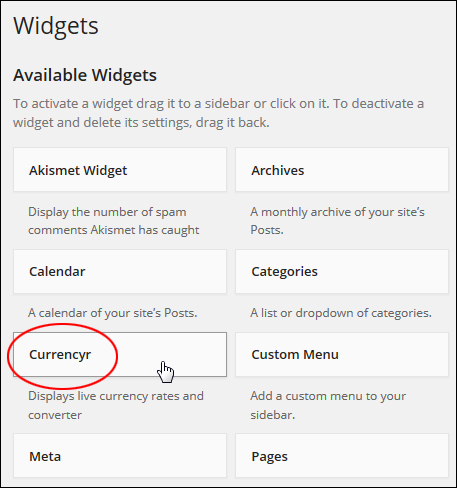
Configure the widget settings as shown in the example below (add any currency codes you would like to display on your widget separated by a comma), and click Save to update your settings …
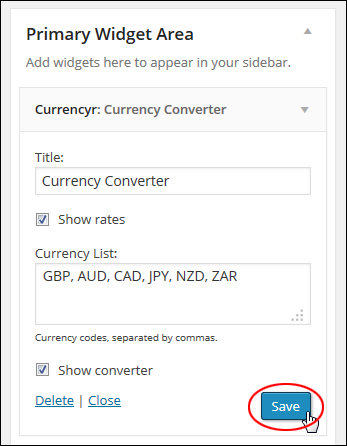
The currency converter will now show on your website’s sidebar with the options you have selected …
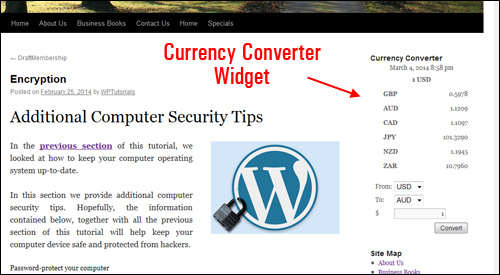
Additional Plugin Notes
Here are some additional notes and useful information about using the Currencyr plugin.
Currency Separator
The Currencyr plugin allows you to specify the symbol to display as the currency separator when using multiple currencies.
You can change the symbol in the Multiple Separator settings field.
So, for example, entering the default symbol “/” (forward slash) …

Separates all your currency amounts with a forward slash as you can see in the screenshot below …
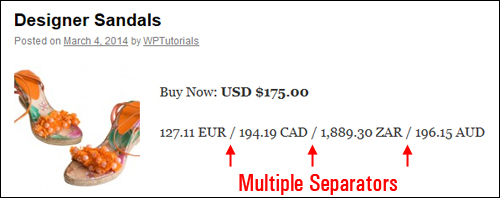
If you change the symbol and update your plugin settings …

Your web visitors will see the new symbol being used as the currency separator …
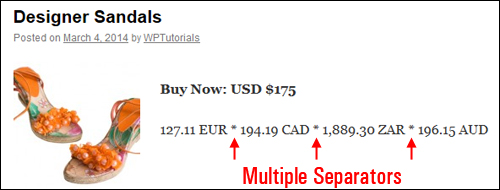
E-Commerce Integration
As stated earlier, the plugin can be integrated with various WP-compatible e-commerce plugins such as WooCommerce, Shopp, and Easy Digital Downloads …
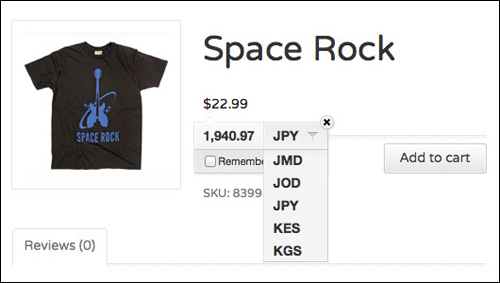
(image sourced from Currencyr plugin site)
And there you have it! Now you know how to easily add currency conversion to your e-commerce web site.
To learn more about WordPress e-commerce plugins, see the tutorial below:
***
"If you're new to WordPress, this can stand on its own as a training course and will stay with you as you progress from beginner to advanced and even guru status." - Bruce (Columbus, Ohio)

